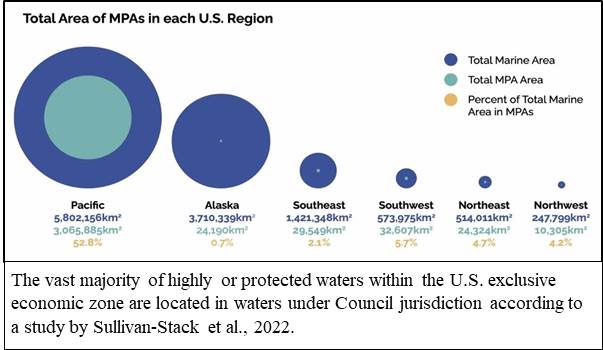News and Announcements
Press Release – Western Pacific Federal Managers Support Conservation Definition and Request Better Coordination with NOAA on ESA Biological Opinions (22 June 2022)
 HONOLULU (22 June 2022) Today, the Council requested NOAA and the Council for Environmental Quality (CEQ) adopt a Council Coordination Committee (CCC) area-based management subcommittee’s proposed definition of “conservation area” to identify qualifying regions in President Biden’s “30×30” initiative. The CCC represents the eight Regional Fishery Management Councils in the nation.
HONOLULU (22 June 2022) Today, the Council requested NOAA and the Council for Environmental Quality (CEQ) adopt a Council Coordination Committee (CCC) area-based management subcommittee’s proposed definition of “conservation area” to identify qualifying regions in President Biden’s “30×30” initiative. The CCC represents the eight Regional Fishery Management Councils in the nation.“The Council has a golden opportunity to support what the CCC has done, and help NOAA and the CEQ move forward with a sensible and fair definition of conservation that not only includes provisions to protect biodiversity, but also promotes wise use of fisheries,” said Will Sword, Council vice chair from American Samoa.
The Council recommends CEQ follow National Environmental Protection Act (NEPA) guidelines when implementing America the Beautiful and consult state and territorial governors affected by new conservation areas. In addition, the Council will inform NOAA, the CEQ and Biden Administration that the Western Pacific Region has met 97% of the “30×30” goal to conserve 30% of all U.S. lands and waters by 2030 with its existing marine managed areas.
The Council called upon NOAA National Marine Fisheries Service (NMFS) to include the Council in developing any reasonable and prudent measures in advance of the draft biological opinions on the Hawai‘i deep-set and American Samoa longline fisheries. The biological opinion assesses if the fisheries are likely to jeopardize the continued existence or recovery of Endangered Species Act-listed species.
A NMFS policy directive recognizes the Council’s unique role in helping the agency comply with the ESA. The Council is charged with developing fishery management regulations under the Magnuson-Stevens Act, which are approved by the Secretary of Commerce and then implemented by NMFS. Despite repeated Council requests over the past three years, NMFS has not discussed potential measures that may be needed to reduce the fisheries’ impacts on ESA-listed species.
The Council recommended setting a 2023 catch limit of 2,000 metric tons (mt) of bigeye tuna each for American Samoa, Guam and the Commonwealth of the Northern Marianas (CNMI). Each U.S. Participating Territory would have a transfer limit up to 1,500 mt to Hawai‘i-based U.S. longline vessels operating under approved specified fishing agreements with the territories. Total transfers would be limited to 3,000 mt.
The Hawai‘i longline fishery has a low impact (3% of total catch) on the Western and Central Pacific (WCPO) bigeye tuna stock. The Council recommended exploring an increase to the U.S. longline catch limit for WCPO bigeye tuna and increasing future allocation limits from the territories to Hawai‘i-based longline vessels.
In the 2021 annual report on the status of fisheries in the region, pelagic fisheries catch increased across gear types, resulting in increased revenue from high fish prices. Bottomfish fisheries in the CNMI and Guam increased substantially in catch and effort. Bottomfish catch in American Samoa waned to its lowest level over the past decade—the average yearly catch of approximately 12,000 pounds dropped to just over 2,000 pounds in 2021. Reports will be available on the Council website next week.
The Council held an equity and environmental justice (EEJ) workshop in April that brought together indigenous Council members, advisory panel members, NOAA regional staff and leaders in the Western Pacific Region. To effect EEJ momentum in our region, participants emphasized the importance of outreach and engagement, building local capacity, fostering a bottom-up approach, funding community projects, collaborating with local agencies and managing climate change impacts. Based on this workshop, the Council will provide comments on the NMFS draft EEJ strategy to identify long-standing issues in the U.S. Pacific Islands.
Western Pacific Regional Fishery Management Council: Secretary of Commerce appointees from nominees selected by American Samoa, CNMI, Guam and Hawai‘i governors: Roger Dang, Fresh Island Fish Co. (Hawai‘i) (vice chair); Manny Dueñas, Guam Fishermen’s Cooperative Association (Guam) (vice chair); John Gourley, Micronesian Environmental Services (CNMI) (vice chair); Will Sword, noncommercial fisherman/engineer (American Samoa) (vice chair); Monique Amani, business owner (Guam); Howard Dunham, commercial fisherman (American Samoa); Matt Ramsey, Conservation International (Hawai‘i); and McGrew Rice, charter boat captain (CNMI). Designated state officials: Anthony Benavente, CNMI Dept. of Lands and Natural Resources; Suzanne Case, Hawai‘i Dept. of Land & Natural Resources; Chelsa Muña-Brecht, Guam Dept. of Agriculture; and Archie Soliai, American Samoa Dept. of Marine & Wildlife Resources (chair). Designated federal officials (voting): Michael Tosatto, NMFS Pacific Islands Regional Office. Designated federal officials (nonvoting): Colin Brinkman, U.S. Dept. of State; Brian Peck, U.S. Fish and Wildlife Service; and RADM Mike Day, U.S. Coast Guard 14th District.
